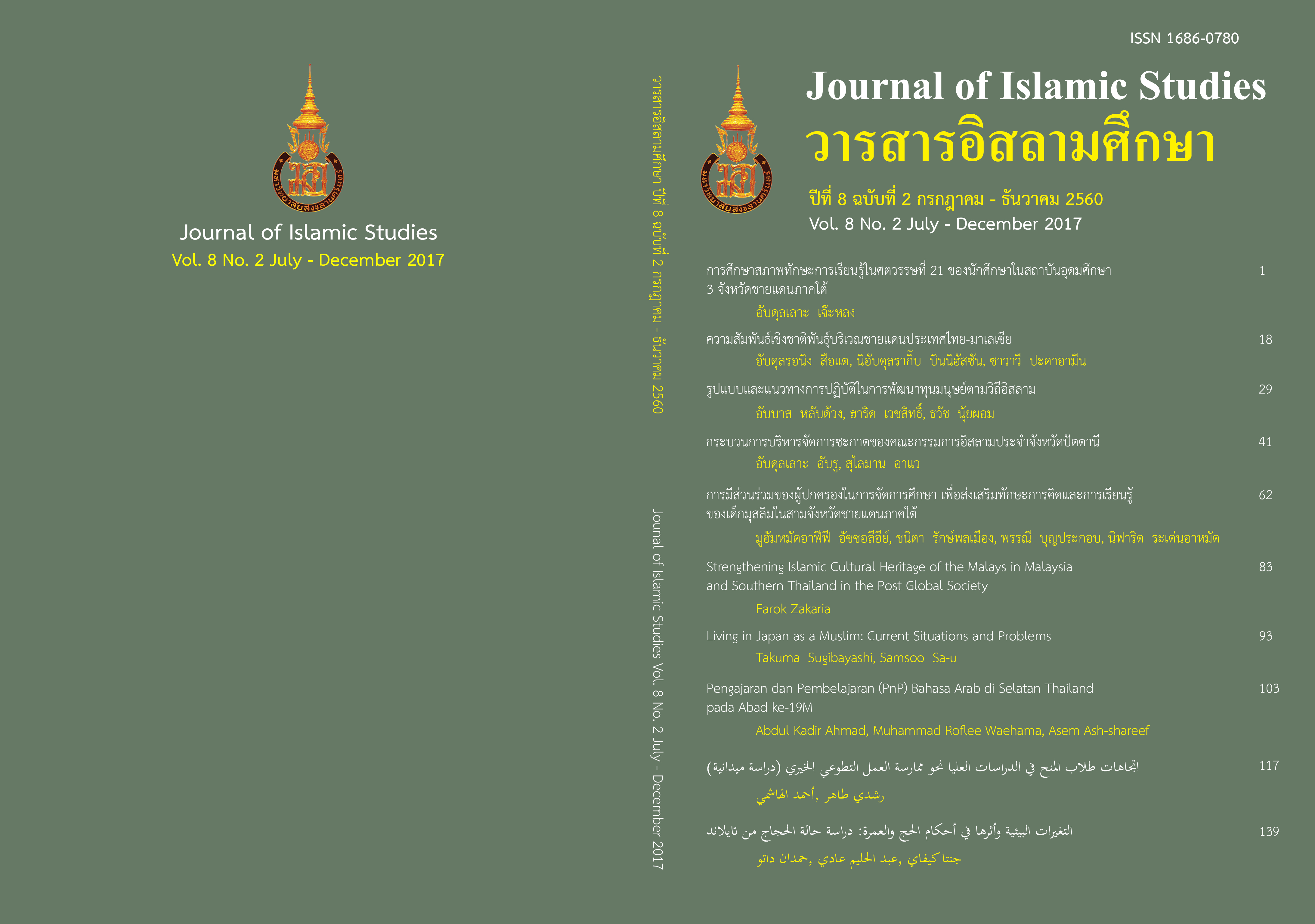Parental Involvement in Education to Develop Thinking and Learning Skills of Muslim Children in Three Southern Border Provinces
Keywords:
Parental, Involvement in Education, Thinking and Learning Skills, Muslim Parents, Muslim Children, Three Southern Border ProvincesAbstract
This research aimed to find out parental involvement in education to develop thinking and learning skills of Muslim children in three southern border provinces and parents' perceptions about conditional factors of the involvement in education. Fifty-one parents (Pattani 17, Yala 21, and Narathiwat 13 people) were purposively selected to participate in this study. In this research, a four (4) stage process of Participatory Action Research (PAR) were applied which include establishing relationship and common understanding, planing and research designing, planning implementation, and evaluation and planning development using focus group discussion techniques. It was found that parental involvement in education to develop thinking and learning skills of Muslim children involved 5 categories namely Islamic based parenting, Islamic integrated home-based learning, collaborating with the school, community involvement, and self-Improvement and parental education. There were ten conditions related to the involvement, namely, parent’s involvement knowledge, time management, family relationship, role model, continuity, ICT skills, commitment, home environment, parent-school relationship, and parent-community relationship.
References
พร้อมพิไล บัวสุวรรณ. (2554). ผู้ปกครองและผู้เรียนหุ้นส่วนเพื่อคุณภาพของผู้เรียน. กรุงเทพฯ: สำนักพิมพ์แสงดาว.
สมาคมนักเรียนเก่าอาหรับ. (2542). พระมหาคัมภีร์อัลกุรอานพร้อมความหมายภาษาไทย. อัลมะดีนะฮฺอัลมุเนาวะเราฮฺ: ศูนย์กษัตริย์ฟาฮัด เพื่อการพิมพ์อัลกุรอาน.
สุมน อมรวิวัฒน์. (2545). รายงานผลการดำเนินงานโครงการนำร่องระดับชาติ เรื่อง การปฏิรูปกระบวนการเรียนรู้ในโรงเรียนนำร่อง: รูปแบบที่คัดสรร. กรุงเทพฯ: เอสดีเคเปเปอร์แอนด์ฟอร์ม.
อับดุรเราะห์มาน อัช-ชีหะฮฺ. (2553). สิทธิของสตรีในฐานะบุตรสาว. แปลโดย อิบนุรอมลี ยูนุส. แหล่งที่มา https://d1.islamhouse.com/.../th_sheehah_huqooq_almaraah_bintan.doc สืบค้นเมื่อวันที่ 11 ตุลาคม 2560
Binkley, M., Erstad, O., Herman, J., Raizen, S., Ripley, M., Miller-Ricci, M., & Rumble, M. (2012). Assessment and teaching of 21st century skills. In P. Griffin, B. McGaw & E. Care (Eds.): Springer.
Blazer, C. (2005). Literature Review on Family Involvement: The Home-School Partnership. Suite: Miami-Dade County Public Schools.
Desforges, C., & Abouchaar, A. (2003). The impact of parental involvement, parental support and family education on pupil achievement and adjustment: a liturature reviews: Queen’s Printer.
Epstein, A. S. (2003). How Planning and Reflection Develop Young Children's Thinking Skills. Young Children, 58(5), 28-36.
Epstein, J. L. (2011). School, family, and community partnerships: Preparing educators and improving schools (2nd ed.). Suite: Westview Press.
Fisher, R. (2001). Philosophy in primary schools: fostering thinking skills and literacy. Reading, 35(2), 67-73.
Grose, M. (2008). Nurture your child’s thinking skills. Retrieved 28 November 2015, from Australia’s leading parenting educator http://holytrinity.act.edu.au/srcfiles/ Thinking-Skills.pdf
Hornby, G. (2011). Parental involvement in childhood education: Building effective school-family partnerships: Springer Science & Business Media.
Hornby, G., & Lafaele, R. (2011). Barriers to parental involvement in education: An explanatory model. Educational Review, 63(1), 37-52.
KidsMatter. (2013). About thinking and learning. Retrieved 29 November 2015 http://www.kidsmatter.edu.au/
Kindon, S., Pain, R., & Kesby, M. (2007). Participatory action research approaches and methods: Connecting people, participation and place. NY: Routledge.
Kocyigita, S. (2015). Family Involvement in Preschool Education: Rationale, Problems and Solutions for the Participants. Educational Sciences: Theory & Practice, 15(1), 1-17.
Miles, M. B., & Huberman, A. M. (1994). Qualitative Data Analysis: an Expanded Sourcebook (2 ed.). Thousand Oaks: Sage Publication.
Nair, S., & Ngang, T. K. (2012). Exploring Parents’ and Teachers’ Views of Primary Pupils’ Thinking Skills and Problem Solving Skills. Creative Education, 3(01), 30.
Niia, A., Almqvist, L., Brunnberg, E., & Granlund, M. (2015). Student participation and parental involvement in relation to academic achievement. Scandinavian Journal of Educational Research, 59(3), 297-315.
Palys, T. (2008). Purposive Sampling. In L. M. Given (Ed.), The Sage encyclopedia of qualitative research methods Sage Publications.
Patrikakou, E. N. (2008). The power of parent involvement: evidence, ideas, and tools for student success. Illinois: Center on Innovation and Improvement.
Pena, D. C. (2000). Parent involvement: Influencing factors and implications. The Journal of Educational Research, 94(1), 42-54.
Redding, S. (1998). Parents and learning: International Academy of Education, UNESCO.
Shenton, A. K. (2004). Strategies for ensuring trustworthiness in qualitative research projects. Education for information, 22(2), 63-75.
Sui-Chu, E. H., & Willms, J. D. (1996). Effects of parental involvement on eighth-grade achievement. Sociology of education, 126-141.
Taneri, P. O. (2012). Roles of parents in enhancing children’s creative thinking skills. International Journal of Human Sciences, 9(2), 90-108.
Wilder, S. (2014). Effects of parental involvement on academic achievement: a meta-synthesis. Educational Review, 66(3), 377-397.
Downloads
Published
How to Cite
Issue
Section
License
Copyright (c) 2017 Journal of Islamic Studies, Prince of Songkla University, Pattani Campus

This work is licensed under a Creative Commons Attribution 4.0 International License.
All articles Published in The Journal of Islamic Studies are author’s opinions, and not the responsibility of the Faculty of Islamic Sciences nor the editorial board. However any citation should be referred to the journal.
















